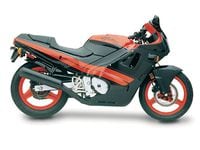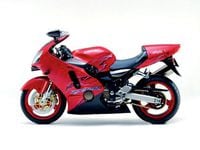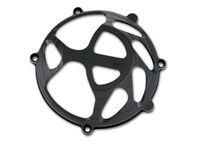Slippery When Wet
How does a slipper clutch affect riding in the rain? On carbureted bikes, I've found lowering the idle to increase engine braking helps in heavy rain. I was wondering how it was with even less engine braking.
Brian Thieme
North Lauderdale, FL
All things being equal, which they rarely are, a slipper clutch should decrease the chances of a slipshod downshift locking the rear wheel and putting you on your head. It all depends on the threshold at which said clutch kicks in to keep the wheel turning. If the pavement is slick enough, the clutch might not slip as readily as you'd expect. The short answer is, as long as your downshifts are as smooth as you can make 'em, the slipper adds a bit of insurance against locking the wheel.
Under Pressure
I have been a subscriber for seven years and you guys have never done me wrong, so I turn to you in my time of need. I am adjusting the valves on a 1987 Honda CBR600F. I wanted to adjust the valves because cylinder #2 is short on compression to the tune of 50 psi. After following the directions in the genuine Honda service manual, I found the compression had dropped in every cylinder by about 5 psi, with the exception of that cylinder, which dropped about 40 psi. After some experimentation I found that with its valves adjusted slightly tight, the compression came back, but only to the original reading and not factory spec. Does this clue you into what might be happening without pulling the head? Burned valve? Worn camshaft? Know anyone with a used CBR600F motor?
Gerald Garthoeffner
St Louis, MO
Several things could have caused your Hurricane's unfortunate loss of compression. A worn cam, a burnt or corroded valve, a scored cylinder wall, worn rings...you get the picture. The next thing to do, if you haven't already, is a leakdown test. That's the only way to find out the percentage of compression you've lost vs. what you need, as well as where you're losing it. Intake? Exhaust? Crankcase? You can usually hear compression leaking from one of those areas before actually removing the head.
Top-Box Man
I'm shopping for a new sport-touring bike that can also handle two-up weekends. The Honda ST1300, Yamaha FJR1300 and BMW R1200RT are the top runners. Both of the Japanese dealers say that adding a top box and passenger to their bikes will make them unstable to the point of being uncomfortable, and that I should go with a Gold Wing or Venture touring rig. This doesn't make sense to me, given the physical size of these bikes, especially with the BMW dealer saying it's no problem. I prefer the Japanese bikes; are the dealers just trying to up-sell me?
Eric Schade
Basking Ridge, NJ
Though American Honda doesn't market an ST1300 top box, Honda Europe sells a nifty 45-liter model. And Yamaha offers a color-matched 39-liter model for the FJR1300 and FJR1300 AE. We can't infer much about your dealer's motives. Either bike will handle a bit differently two-up with bags and a top box. Bearing that in mind, stick to the manufacturer's stated weight limits for each piece of luggage and you're golden.
Sudden Death
I have a question about the possible cause of a problem with my 2001 Kawasaki ZX-12R. On a recent trip to southern Indiana, we got rained on for about four hours. On the way home, I went around a nice, smooth bend and everything shut off. My gauges were locked at 106 mph and 5300 rpm. After I coasted out of the turn, I turned the key off and on to restart bike, but the gauges stayed locked; lights off, motor dead. The bike gave no warning of trouble. I've been asked if it hesitated or stalled, if any warning lights were illuminated or if I noticed fluctuations in the gauges. None of these things happened. I'm completely lost as to what happened.
The bike has roughly 6500 miles on it. I can't check the exact mileage, as the odometer died with the rest of the bike, but my last oil change was right before the trip at 6532 miles. Modifications are a Power Commander III and a Chatterbox, both installed by a dealer. Any thoughts or guidance would be appreciated greatly.
David A. McClure
Fort Wayne, IN
The best news is you managed to keep the beast upright when the lights went out. Beyond that, any sort of electronic postmortem is difficult without actually inspecting the body, as it were. However, Kawasaki engineers maintain that ZX-12R gauges don't just lock up-they either work or they don't. Rule out electromagnetic pulse interference from a North Korean nuclear missile test, and it seems fairly certain your ignition/injection CPU had some sort of nervous breakdown induced or at least encouraged by some combination of water and the Power Commander. Ask the dealer who installed those aftermarket electronics to have a look-and let us know what you find out.
Clutch Clatter
I recently bought a Ducati 999 on which the previous owner installed a laser-cut vented clutch cover. When I first heard the engine idling, I was struck by the very mechanical sound the underlying clutch system made with the spinning plates; it is omnipresent, along with the sweet sound of the Termignoni exhaust he also switched to.
This has therefore led me to two questions: First, is it normal to hear such a clanking sound? Second, what about dirt and water? Is it a good idea to have a vented clutch cover?
Philippe Jordan
Montreal, Quebec, Canada
As our fourth-grade teacher used to say, there's no such thing as a stupid question. Aside from looking cool, a vented cover lets the 999's dry clutch run a whole lot cooler. That means smoother, more consistent engagement, especially if you're running a gauntlet of red lights and stopped traffic. The downside is the clatter you mention and a certain susceptibility to ingesting assorted street crud. But if you're willing to forgo logging roads, stream crossings and other potentially harmful environments, no worries.














/cloudfront-us-east-1.images.arcpublishing.com/octane/VZZXJQ6U3FESFPZCBVXKFSUG4A.jpg)
/cloudfront-us-east-1.images.arcpublishing.com/octane/QCZEPHQAMRHZPLHTDJBIJVWL3M.jpg)
/cloudfront-us-east-1.images.arcpublishing.com/octane/HXOUJXQWA5HBHGRO3EMJIGFMVI.jpg)

/cloudfront-us-east-1.images.arcpublishing.com/octane/3TIWWRV4JBBOLDVGRYECVVTA7Y.jpg)
/cloudfront-us-east-1.images.arcpublishing.com/octane/KIX5O23D5NAIBGFXBN3327DKZU.jpg)
/cloudfront-us-east-1.images.arcpublishing.com/octane/7GJYDUIPXRGMTMQKN6ONYOLBOU.jpg)
/cloudfront-us-east-1.images.arcpublishing.com/octane/MUQLOVLL2ZDGFH25ILABNBXKTI.jpg)
/cloudfront-us-east-1.images.arcpublishing.com/octane/TNOU5DNE2BC57MFPMGN2EIDXAM.jpg)
/cloudfront-us-east-1.images.arcpublishing.com/octane/GTCXACQGJ5HAPDTGWUQKDEH44E.jpg)
/cloudfront-us-east-1.images.arcpublishing.com/octane/S35YGSEMEZB4BLTDJTSZPF4GLA.jpg)
/cloudfront-us-east-1.images.arcpublishing.com/octane/5UOT6HPX2JFMRJAX6EH45AR4MQ.jpg)
/cloudfront-us-east-1.images.arcpublishing.com/octane/OKWOJWAKP5EP3OACCRRWPCIX2Q.jpg)
/cloudfront-us-east-1.images.arcpublishing.com/octane/2WF3SCE3NFBQXLDNJM7KMXA45E.jpg)
/cloudfront-us-east-1.images.arcpublishing.com/octane/G4MG6OUCJNBSHIS2MVVOTPX65E.jpg)
/cloudfront-us-east-1.images.arcpublishing.com/octane/IIGGWFOTOJGB7DB6DGBXCCMTDY.jpg)
/cloudfront-us-east-1.images.arcpublishing.com/octane/QSTCM6AVEZA5JJBUXNIQ3DSOF4.jpg)
/cloudfront-us-east-1.images.arcpublishing.com/octane/U4I7G625B5DMLF2DVIJDFZVV6M.jpg)
/cloudfront-us-east-1.images.arcpublishing.com/octane/B6XD6LS6IVCQPIU6HXDJSM3FHY.jpg)
/cloudfront-us-east-1.images.arcpublishing.com/octane/ICL63FEDDRDTTMINYICCEYGMDA.jpg)
/cloudfront-us-east-1.images.arcpublishing.com/octane/FCGZHQXRBZFLBAPC5SDIQLVF4I.jpg)
/cloudfront-us-east-1.images.arcpublishing.com/octane/WNOB6LDOIFFHJKPSVIWDYUGOPM.jpg)

/cloudfront-us-east-1.images.arcpublishing.com/octane/X33NU3E525ECRHXLNUJN2FTRKI.jpg)